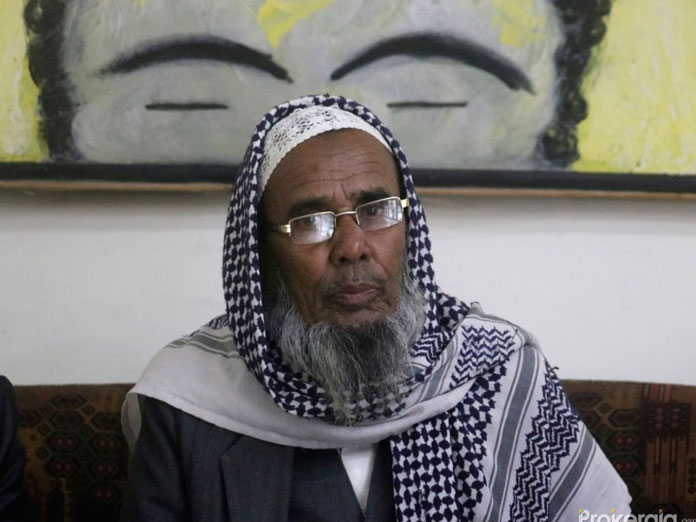Live
- K’taka parties keenly await bypoll results, spotlight on high-profile Channapatna
- Hyderabad Student Aryan Reddy Dies in Tragic Gun Misfire Accident on His Birthday in Atlanta
- Iraqi PM, Putin discuss regional situation, energy cooperation over phone
- Pushpa 2 Shooting Still Pending? Will It Release on Time?
- Can air pollution affect weight gain and hormonal health?
- Vishvaraj Singh Mewar's coronation ceremony in Chittorgarh on Nov 25
- KL Rahul’s Controversial Dismissal Sparks Debate in 1st Test at Perth
- Cricket Australia to honour late Philip Hughes on 10th anniversary
- Khushi Kapoor shines bright
- Suhana Khan’s power dressing game is inspiring
Just In
How an illiterate rickshaw-puller from Assam became a mascot for education


Ahmed Ali from Assams Karimganj district, while pulling his cycle rickshaw one day in the late 1970s, felt miserable at the realization that like him his soontobeborn child too will remain illiterate and may have to pull a rickshaw for a living
New Delhi: Ahmed Ali from Assam's Karimganj district, while pulling his cycle rickshaw one day in the late 1970s, felt miserable at the realization that like him his soon-to-be-born child too will remain illiterate and may have to pull a rickshaw for a living.
Hailing from Madhurband village, when Ali, now 82, moved to Karimganj town, about 300 km from Guwahati, he often saw children attending school and getting educated, and sometimes even ferried them to and from their homes to their schools in his rickshaw.
The thought of his child not getting proper education hit him so hard that he decided he should do something about it so that poor children of the coming generation, including his own, do not suffer in privation like him.
Since then, Ali has gone on to build nine schools and, because of his singular effort, he even found a mention in Prime Minister Narendra Modi's 'Mann Ki Baat' radio programme.
"I feel it was Allah's wish and blessings from locals that I could achieve whatever I wanted," says a humble Ali.
"I could not attend school due to poverty. People of my village were poor and it pained me to see the children there were not able to attend schools due to the same reason. I don't want to see dropouts from poor families any more," Ali told IANS during a function in Delhi where he was invited as a guest.
For establishing the first school, he sold a portion of his land and donated another portion on which the building now stands. The funds for the schools were also arranged by him from his savings, daily earnings and some from charity.
"There were some people in the area who supported the cause and helped in whatever way they could," he said.
To ensure there was no fund crisis for the school, he used to pull his rickshaw in the morning and cut wood at night. He sold that wood and used the money to build the school and later to run it.
"There was not even a single school in the area. I had this very strong feeling that when my children will be born, they too will not have any school. After the birth of my first child (a boy), the feeling became more strong," he said.
The school, he added, was even more important for girls as "boys get a chance to go out and get an education, but girls do not".
With a firm resolve that he should do something about it, Ali met an education officer, whom he used to ferry in his rickshaw, and with his help, he established a middle school in his village in 1978.
"Soon after it was established, I realised that first, we needed a primary school. Until children were educated at the primary level, who will get enrolled in middle school? In 1980, three-LP (Lower Primary) schools were opened," he said.
In all, Ali has opened three lower primary (class I-V) schools, five middle (class VI-VIII) schools and one high school in Madhurband and nearby villages.
"Education is an important thing, and everyone should get a chance to get educated. It is a sin for anybody to not be educated," he said.
"Although I may be illiterate, I get respect from people. They now come to seek my blessings. I feel joy when I see that boys and girls from the village have been attending school. This joy inspired me and I never felt tired," said Ali.
"I get satisfaction when girls come and tell me how helpful these schools were for them. Every year, the overall number of girls in schools is higher than boys."
The high school, started in 1990, has 228 students in the current year. Every year, hundreds of students appear for the Class X exams, but they don't have a place to study further.
"I could only manage to make arrangements for students till Class X. They don't have a place to study Class XI and XII. I need both the government's approval and funds for setting up the higher-secondary school," Ali said, in the hope that he will soon accomplish that as well.
"There is no nearby college. The nearest college is also 15 km away. I also want to build a college for students, but that will come at a later stage. First we need a junior college (for students passing Class X)," he added.
Ali came to limelight in March last year when Prime Minister Modi spoke about him in his monthly "Mann Ki Baat" address.
Ali feels proud that the Prime Minister acknowledged his work and he desires to meet Modi.
Asked what he will tell Modi, Ali said he wanted all that the schools should be government-recognised so that funds were never an issue. "I will also ask him for a junior college and a college, if possible."
-Nivedita Singh

© 2024 Hyderabad Media House Limited/The Hans India. All rights reserved. Powered by hocalwire.com






